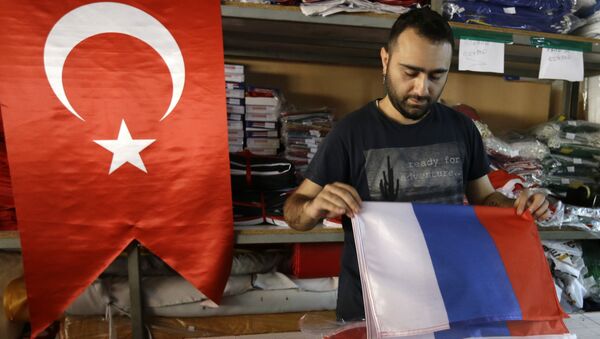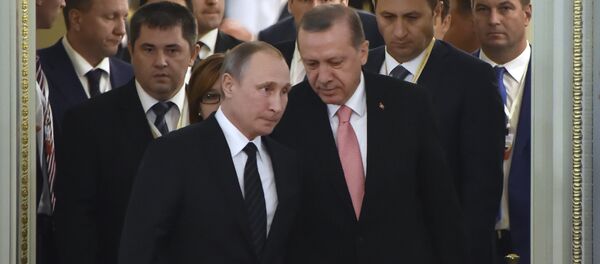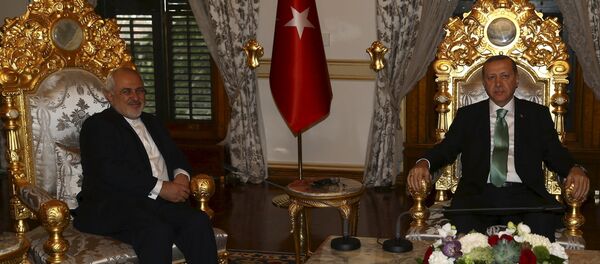Over the past week, geopolitics analysts from around the world have focused a great deal of attention on the talks between Russian President Vladimir Putin and his Turkish counterpart Recep Tayyip Erdogan in St. Petersburg August 9. Naturally, Stratfor was no exception, publishing its own commentary on the meeting.
However, Russian commentators have noticed that something was very off about the think tank's analysis. For her part, PolitRussia contributor Olga Ikonnikova suggested that the analysis looked more like propaganda than an objective inquiry.
The journalist wrote that when it comes to standard propaganda fare, "the American press has two themes: either 'Putin is to blame for everything' or 'America will triumph'." According to Ikonnikova, both were on display in Stratfor's piece on the Putin-Erdogan meeting.
"To get Washington to take its demands seriously, Russia needed to position itself as both a spoiler and a mediator in a conflict consuming the United States' attention," the think tank wrote. "First that conflict was Iran, but once the United States negotiated its way to the Iran nuclear deal, Russia shifted its focus to Syria," the analysis added.
Meanwhile, Stratfor noted, Turkey's policy against its Kurdish minority in the south of the country, and efforts to destabilize neighboring Syria, was really just an indication of Ankara's security concerns. "Just as Russia had decided to deepen its involvement in Syria, the Turkish government was making plans to step in to deal with the growing Kurdish and Islamic State threat," the analysis reads.
Commenting on that suggestion, Ikonnikova noted that the idea that Ankara, long accused of assisting Daesh, was actually concerned with the terrorist threat, sounded "very unconvincing," especially coming from the mouth of the so-called Shadow CIA.
"And what follows is a classic American smugness which should bring a tear to every true patriot's eye," the journalist added, because what Stratfor suggested next was that Washington had purposely 'allowed' Ankara to pursue a policy of rapprochement with Moscow.
"Did you get that?" Ikonnikova sarcastically asked. "We sat down at the negotiating table with Turkey not as a result of the apology from the Turkish president, not because of the concessions which Turkey agreed to in Syria. No, the negotiations are being conducted solely thanks to the United States."
"Of course, that is Stratfor's version," the journalist noted. "I, you will understand, have my own. Factually, following the reconciliation with Russia, Turkey closed the famous border crossing at Bab al-Hawa. It was through this area that the militants constantly crossed back and forth between Turkey and Syria. Only after this did a Syrian-Russian humanitarian operation in Aleppo become possible – an operation which, most likely, will soon enter a military phase."
"And the bitter truth for the US is the fact that the situation in Syria is no long under their control. Moreover, after the liberation of Aleppo, the war which Washington has long supported and nourished will come to an end."
Ultimately, Ikonnikova noted, "Russia has no illusions about any 'inseparableness' with Turkey, no matter how much President Erdogan may call Putin a 'dear friend'. But so long as one side is ready for concessions and convergence, we will use these circumstances. And our American partners shouldn't concern themselves about it."



